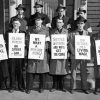Historians Daniel Samson and Keith Grant are building a digital repository of the private libraries of Nova Scotian readers. On that quest, Samson recently spent a day at the Beaton Institute, Cape Breton University, going through the private library of the early-20th-century Cape Breton labour leader J. B. McLachlan (1869-1937).
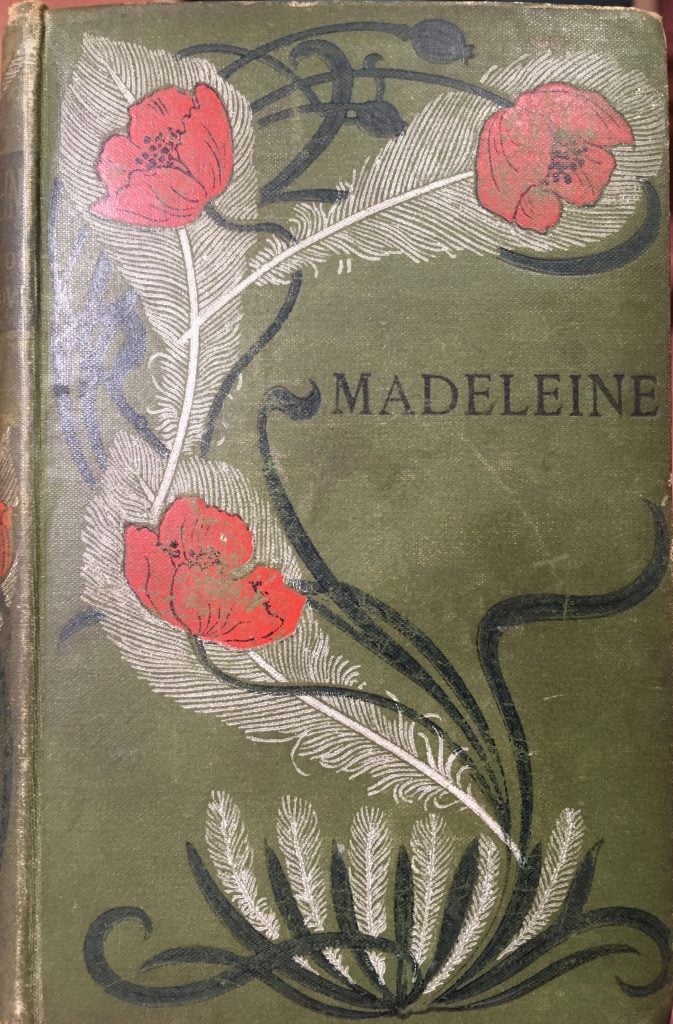
I didn’t expect to find a story of French love in J.B. McLachlan’s library, but there it was. Nor did I expect to find a series of adventure novels by Bret Harte, poetry by Shelley, and readers in French and Greek language instruction. But why should I be surprised? People are always more varied than their public personae and their libraries often offer helpful insights into that complexity.
McLachlan was, I think without doubt, the most important labour figure in Nova Scotia history and his role with the Communist Party also gave him a national public prominence. And that side of McLachlan is well represented in the collection. There’s some Lenin, Engels [The Origin of the Family, Private Property, and the State], a history of the Paris commune, and even works on evolution and H.G. Wells’s Short History of the World. More surprising was the number of religious texts – I didn’t count, but about a third – with a heavy concentration of Presbyterian works from the middle and late 19th century.
McLachlan remains a vibrant figure in our day in part because of his place in popular memory, but increasingly so because of David Frank’s superb J.B. McLachlan: A Biography (Toronto, Lorimer, 1999). It’s a wonderful book that allows us to see the powerful orator and leader in action. There are few more careful historians than Frank; his research is extensive and his highly skilled and subtle writing really brings McLachlan’s world to life. Having read it twenty years ago, I remembered it as heavy on politics and light on religion. Returning to Frank’s biography, not surprisingly, the politics of labour dominates, but there is no doubt as to Presbyterianism’s moral, foundational role in the development of a communist life. While rarely specifically raising the issue of faith, the biography doesn’t allow religion to fall by the wayside in the narrative push to McLachlan’s full immersion in working-class radicalism.
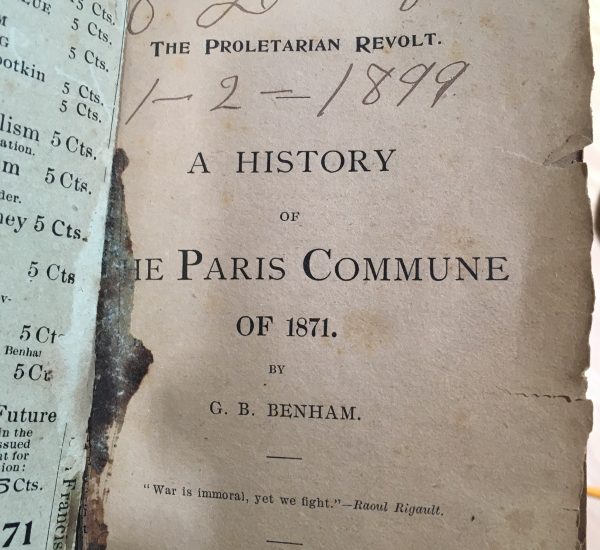
Presbyterianism seems to have been a powerful force in McLachlan’s life and I’m intrigued by his apparent movement to secular politics. Faith, as opposed to the residual culture of religion, appears to have been messier. It’s fairly clear that he drifted farther from his foundation as he grew older, and as the very real demands of political struggle overtook the struggle of faith. But that movement from someone reared in critical Free Church, Presbyterian thinking, with its overt anti-statist, in some ways anti-authority, position on church, and broader, forms of government, to that of a Communist leader is remarkable. The injustice of a state church – be it Scottish, English, or Roman – imposing its way on good and pious men and women surely found expression in his later Communist politics.
The continued existence of a library with the Bible and works of biblical criticism suggest that foundation was not wholly forgotten, and that it may have continued to influence McLachlan in parallel with the many radical texts he consumed in the 1920s and 30s.
Most of the older books no doubt belonged to his parents, and it’s certainly possible that he held onto them as nostalgic mementos. Even for the later works, we don’t know for certain that he purchased them, only that they were in his library. But he signed and dated several after 1890. One, Andrew M’Lean’s The Commission Given by Jesus Christ to His Apostles (Elgin, Peter Macdonald, 1848), is signed and dated “James McLachlan, April 30th 1900”. To that extent, then, in the 1890s, when his biographer has him already radicalised, he appears still to have been actively engaging his faith. All of this suggests that the man who brought his family to Cape Breton in 1902 remained a man of faith.
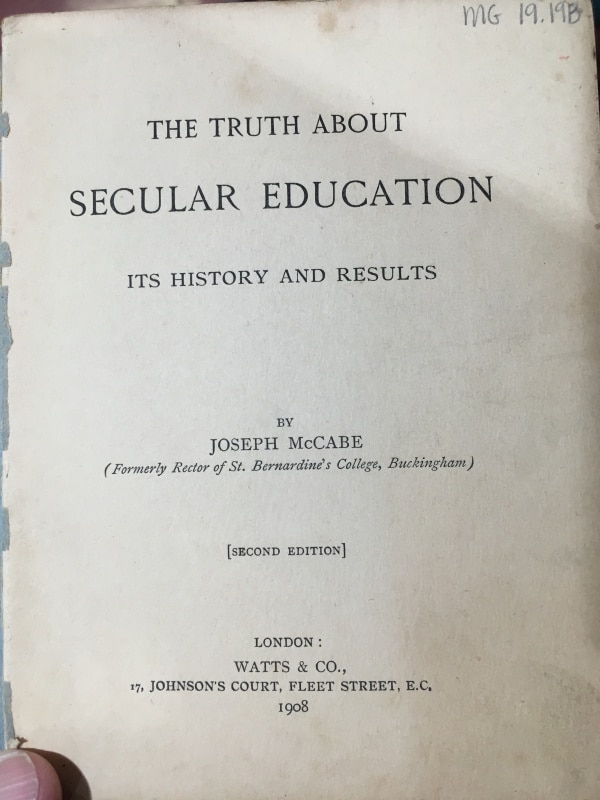
Some evidence of a dramatic shift in McLachlan’s faith comes from his possession of Joseph McCabe’s The Truth About Secular Education(London, Watts & Co, 1908). Similar to a good many evangelical Christians in the late 19th-century, McCabe drifted from Franciscan Catholicism to rationalism in the 1890s. McCabe’s path was common during the rise of rationalist and secular free thought in the late 19th century. Few of the major figures of the secularist movement were muddy-eyed liberal agnostics; they were more commonly raised in deeply religious households, often including formal religious training. McCabe’s book was published in 1908, six years after McLachlan arrived in Nova Scotia. Whether it marks a real engagement with the secularist movement, or simply a curiosity about a fashionable subject, his acquisition of the book suggests some kind of critical exploration of the path from faith. Similarly, the books on evolution and Well’s history may suggest other dimensions of what may have been a protracted movement from Presbyterianism to Communism.
There is, however, one religious dimension of the library that is not treated in Frank’s biography of McLachlan. It suggests a still more protracted route, one marked by older elements of his Presbyterian past: the presence of a clear anti-Catholic dimension to several of the religious works. British Protestantism was steeped in anti-Catholicism, and probably no sect more clearly embraced that antipathy than the Presyterians. Indeed, the presence in McLachlan’s library of John M’Donald’s Romanism Analyzed … An Examination of the Errors of Popery (1894) and William Anderson’s Exposure of Popery (1878), as well as the classic anti-Catholic text, John Foxe’s Book of Martyrs (originally 1573, but republished often throughout the 19th century) suggest a continued immersion not only in theological texts, but also in anti-Catholic thinking. It’s likely that Foxe’s book belonged to his parents, and perhaps Anderson’s, too, but M’Donald’s book was published a year after McLachlan married. At the very minimum, then, at a time when McLachlan’s reading was transitioning into more radical terrain, and as he brought his family to Cape Breton, older anti-Catholic works, and at least one new one, remained on his shelves.
What does it mean that J.B. McLachlan held onto these books? For me, this was the most interesting dimension of his library. There’s lots of possibilities here, but the most obvious question is, was McLachlan an anti-Catholic bigot? I don’t think so, but it would not have been unlikely given the make-up of the older Nova Scotia union, the Provincial Workmen’s Association where there was plenty of anti-Catholicism, as well as flat-out racism.
Certainly the McLachlan we see in the 1920s showed no signs of such bigotry. His biographer Frank notes that such charges were occasionally made, but these were invaribly smears tossed out by business leaders and the church, designed to distract their increasingly left-looking members. McLachlan spoke clearly, and directly, to all industrial Cape Breton’s peoples: Catholic, Protestant and Jews, blacks and whites. There is no evidence that he was in any way actively anti-Catholic.
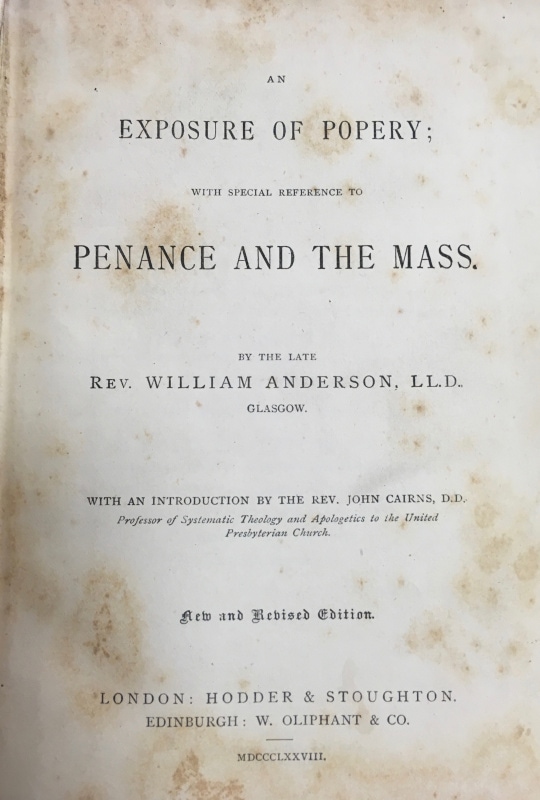
Popery (Edinburgh, Oliphant, 1878).
Source: Beaton Institute.
And thus it’s worthwhile considering the path of a man, steeped in the ages-old anti-Catholicism of 19th-century Scottish Presbyterianism. While there’s no evidence of him every having been actively anti-Catholic, it’s hard to imagine he was unaffected by the deep culural force it held in Presbyterian practice. He appears not to have regularly attended church. Yet, Frank tells us that McLachlan continued to read aloud to his family from the Bible on Sundays, keeping alive at least parts of the old faith, just as his parents had. But this was not his parents’ world, and it’s here where we can imagine something of the Presbyterian Communist’s path. The complex, culturally plural experience of Cape Breton must have made clear to him that ancient prejudices and their cultural divides were the enemy of the working class.
McLachlan’s Old-World radicalisation combined with the challenges posed by the more varied culture of New-World, industrial Cape Breton must have compelled him to examine the shared plight of workers in new ways. It was precisely in overcoming those divisions, particularly the privileging of some workers over others, a game played by the companies and the older unions alike, that enabled McLachlan and the other left leaders of the day to move industrial Cape Breton from the era of company towns to that of labour towns. J.B. McLachlan had a profound impact on Cape Breton, but Cape Breton seems to have had a profound influence on him as well.
Daniel Joseph Samson is a rural colonial Canadian historian at Brock University. This article was originally published on his website Rural Colonial Nova Scotia, and is republished here with his kind permission. Follow him on Twitter, where he tracks the daily observations on matters of life, death and the weather by James Barry, a Pictou County miller and diarist (1822-1906).
With a special thanks to our generous donors who make publication of the Nova Scotia Advocate possible.
Subscribe to the Nova Scotia Advocate weekly digest and never miss an article again. It’s free!


